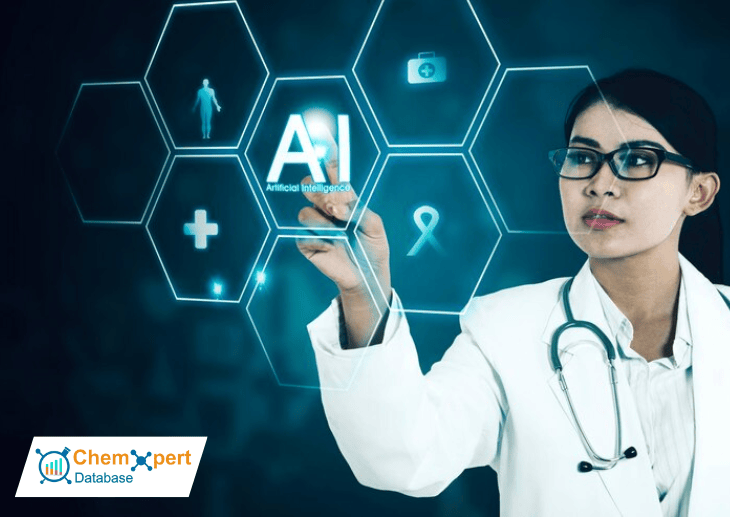Healthcare, drug discovery and patient management are being completely transformed by combining artificial intelligence with the pharmaceutical industry. As we move into the digital age, AI becomes a powerful ally that increases decision making, reduces research time and encourages novel solutions. Let us take a look at how artificial intelligence is changing the world of pharmaceutical companies in this blog.
Current Uses of AI in Pharma
1. Drug Discovery and Development:
- For the purpose of identifying possible drug candidates, Machine Learning algorithms analyze large data sets. These algorithms predict molecular interactions, assess toxicity and optimize drug properties.
- In order to speed up the development and synthesis of new compounds and reduce the time and cost of drug development, AI driven simulations accelerate the development and synthesis of new compounds.
- The breakthrough in drug discovery is driven by collaboration between major pharmaceutical companies such as Roche, Pfizer and Novartis and AI vendors.
2. Clinical Trials Optimization:
- By finding appropriate patient populations, optimizing protocols and anticipating the response of patients, artificial intelligence is streamlining study design.
- In order to improve the efficiency of trials and recruited patients, real-world evidence is used.
3. Personalized Medicine:
- AI is looking at patient data (genomics, proteomics and clinical history) to develop treatments based on the characteristics of patients.
- The selection of personalized therapy based on the prediction models leads to better outcomes in patients.
4. Drug Repurposing:
An artificial intelligence identifies existing medicines that could be used for new indications. The availability of treatment will be accelerated through this approach.
5. Medical Imaging and Diagnostics:
- In order to aid diagnosis, AI algorithms interpret medical images such as X-rays, MRI's and CT-scans.
- Computer vision is able to detect anomalies, tumors and other abnormalities with exceptional accuracy.
6. Supply Chain Optimization:
By anticipating demand, optimizing stocks and ensuring effective delivery of medicines, AI is enhancing the efficacy of supply chain management.
Economic Impact and Productivity Boost:
- All dimensions of the pharma sector, including pharmaceutical manufacturing, packaging, marketing and others are now generating billions of dollars in value. These have been completely transformed by generative AI.
- For the pharmaceutical and medical products sectors, AI could generate up to USD 60 billion to USD 110 billion per year. (Courtesy: Mckinsey)
- AI is accelerating the identification of new medicinal products, speeding up their development and approval as well as improving marketing strategies.
Best Cases of AI Implementation
- In order to accelerate the discovery of new drug candidates, GSK has entered into a partnership with Cloud Pharmaceuticals.
- The identification of potential treatments is accelerated by the use of artificial intelligence.
The Future of AI in Pharma
- Precision Medicine: In view of genetic variation, lifestyle factors and disease progression, AI will further refine the personalized treatment plan.
- Drug Safety and Adverse Event Prediction: In order to improve patient safety, artificial intelligence models will predict adverse drug reactions.
- Natural Language Processing (NLP): In order to help researchers and physicians, NLP algorithms will extract valuable information from scientific literature.
- Drug Manufacturing Optimization: The efficiency of drug production will be improved through the optimization of processes driven by artificial intelligence.
Promising Areas of Value:
- Accelerated Drug Discovery: In order to identify potential drug candidates, AI shortens the period of time.
- Improved Clinical Development: The costs and time for trials are reduced by artificial intelligence.
- Enhanced Operations: Tasks such as document creation and record keeping are automated by artificial intelligence.
- Effective Commercial Strategies: Targeted marketing materials benefit from artificial intelligence.
- Optimized Medical Affairs: For researchers and medical liaisons, AI is boosting productivity.
Future Directions:
- Precision Medicine: AI's going to refine your personalized treatment plan.
- Drug Safety Prediction: Adverse reactions will be expected by AI models.
- Natural Language Processing (NLP): Getting insights from science literature.
- Drug Manufacturing Optimization: AI-driven process improvements.
Chemxpert Database
The Chemxpert database is a powerful resource in this ever changing industry, seamlessly integrating artificial intelligence to enhance decision making, research, and regulatory compliance.
Comprehensive Data Hub:
Chemxpert Database is a pharma database service provider company, offering a valuable insights related to buyers, suppliers, market size, clinical trials, patents, certifications, regulatory services, and pricing trends in the pharma and life sciences sectors. It collects data from reliable sources, meticulously incorporates algorithms to update accurately.
Conclusion
In conclusion, artificial intelligence is far beyond a simple word; it's a revolutionary force for medicine. Innovative concepts for improving patient outcomes and transforming healthcare delivery are set to be introduced by technologies like Artificial Intelligence.
Let’s apply Data-Driven Pricing to Your APIs
Sick and tired of always wondering if you are being asked to pay the right price for your APIs? This empowers you with the answers you need to make the right decisions in the Global API market.
Chemxpert Database is one of the biggest and most comprehensive directories of pharma and chemicals, manufacturers, suppliers and information. Provided with current information on prices, demand and transactions, it gives you instant feedback on whether you are buying what is right and at the right time.
Start using market intelligence today and allow yourself to be in control in the API market.
Check it out today and make more informed sourcing decisions!
Learn More!

